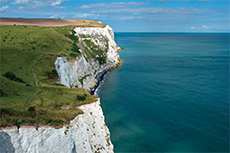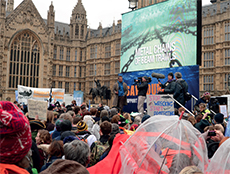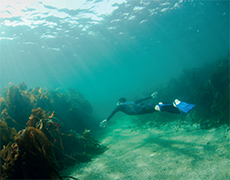




| Home | Features | Club Nights | Underwater Pics | Feedback | Non-Celebrity Diver | Events | 8 August 2025 |
| Blog | Archive | Medical FAQs | Competitions | Travel Offers | The Crew | Contact Us | MDC | LDC |

|

|
 
 |
   ISSUE 18 ARCHIVE - ECO CHAT: UK'S MARINE CONSERVATION ZONESJuliet SavigearThe deadline for the consultation on the 31 designated Marine Conservation Zones (MCZs) has almost arrived (31st March 2013). There is no doubt that the decisions that will come as a result of thiswill interest us scuba divers, and not just those that enjoy plunging into the colourful and varied marine environment we have around our beautiful coastline. The aim of the new MCZs is to protect key areas of the waters around our country through controls such as the prevention of trawling and dredging of the seabeds that destroy so much of the delicate and sometimes vulnerable marine eco-system. What has upset many conservation groups is that of the 127 MCZs that were recommended by the Government’s own science advisers (including 58 that are said to be severely threatened or in need of immediate protection), only 31 have currently been designated for protection. I decided that in this issue’s Eco-Chat that I would go directly to the person who is responsible for ensuring that our country makes the right decision in this matter, the Minister for the Environment, Richard Benyon MP. And this is what his press office came back to me with: What do you hope will be the outcome for these 31 new Marine Conservation Zones? By creating a network of marine protected areas we will be able to protect the important wildlife and habitats that live in our seas. When an area becomes a Marine Conservation Zone what controls are implemented? Are there different levels of protection? If so, what are these? How are these controls enforced? Enforcement of MCZs will be undertaken by the regulatory authorities responsible for the activities concerned. For example, inshore fisheries will be managed by the relevant IFCA, whilst offshore fishing will be managed by the Marine Management Organisation. Where an activity, such as fishing, is detrimental to the specific conservation aims of an MCZ, then management of it will need to be considered by the relevant regulatory authority. We will only manage activities that have a detrimental impact on achieving the conservation aims of the MCZ. Where activities are not damaging to the species or habitats being conserved in an MCZ, then they will not need to be managed. Other than the protection for the marine environment, what other issues do you have to consider when making your proposals for any protected area? Our decisions have been based on sound evidence to ensure we create successful well-managed MCZs. Information was provided by the regional projects (Finding Sanctuary and Balanced Seas). The Government is criticised by many conservation groups for not introducing more MCZs. Why have these 31 particular areas been chosen and not others from the original list of 127 areas that were on the list produced by Natural England and the Joint Nature Conservation Committee? This is not about numbers or about drawing lines on a map. It is about setting out what we are protecting and where, and that these areas are properly managed to protect the marine environment. We carefully considered all of the evidence, and these 31 sites are the ones that are suitable to be designated later this year. Do you plan to introduce other areas in the future? And if so, When? This is not the total of our ambitions and we will be taking forward more sites in the next phase. OTHER FACTS
Marine Conservation Zone interactive map. |